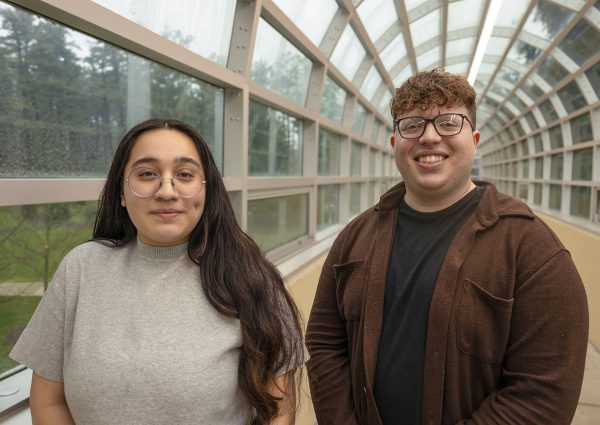
Kimberly Velazquez (left) and Kamran Haider (right) aim to build more community on campus by implementing U-Mich’s aMplify program at WCC in the fall. Paula Farmer | Washtenaw Voice
Caleb Henderson
Editor
When WCC students Kamran Haider and Kimberly Velazquez set out to compete in the optiMize Social Innovation Challenge last fall, they spent countless hours going around WCC and conducting surveys to see what transfer students felt they were missing the most on campus.
After nearly a full day of gathering intel, the results were clear: students felt there wasn’t a strong sense of community and had an added level of difficulty meeting people at the college in general.
“There really wasn’t something people could gravitate towards, and we kinda agreed with that,” Velazquez said, remarking further on what students meant by a “lack of community” at school.
To rectify this problem, Haider and Velazquez set out on pitching an idea designed to get students more involved—one that entailed bringing U-Mich’s aMplify program to WCC.
The aMplify program at U-Mich is a community dinner hosted at the university every other Monday by students for transfer students in an effort to help newcomers get more acclimated to their new surroundings.
The pair submitted the idea to the aforementioned Social Innovation Challenge and had it approved by optiMize, securing $10,000 in funding to implement their vision.
Dallas McGhee-Henry, the current marketing and communications manager of aMplify was at one point a transfer student himself—-enrolling at U-Mich in January 2020 from Oakland Community College (OCC).
McGhee-Henry’s initial experience in Ann Arbor wasn’t great. Being on a massive campus was a major adjustment from the much smaller stomping grounds of OCC, and the COVID-19 pandemic/lockdown period just a couple of months after his initial enrollment certainly didn’t help.
“It wasn’t until I found optiMize that I found community on campus,” he said.
Graduating with a bachelor of arts degree in 2021, McGhee-Henry was hired as a transfer bridge fellow, the next step up the ladder once one is accepted into the optiMize program before eventually working his way up to his current role of supervisor in May of 2022.
As manager of the program, McGhee-Henry is just one of many mentors that transfer students who attend aMplify events can use as resources—and the one that Haider and Velazquez chose to guide them along their journey of implementing their idea at WCC.
Seeing the impact that aMplify had at U-Mich, the two WCC students pitched the idea of bringing something similar to campus in an effort to build a community that survey respondents said was missing at the school.
Haider and Velazquez plan to implement this in the form of monthly mixers led by fellow students that feature workshops on transferring, guest speakers, networking opportunities with other like-minded individuals and more—the goal being to make the program self-sustainable enough to last many years after the duo graduate.
“We want this to keep going and not just be a thing while we’re still in school,” Haider said.
With five figures in funding, Haider and Velazquez plan to give WCC its first taste of aMplify in the fall semester of 2024.

